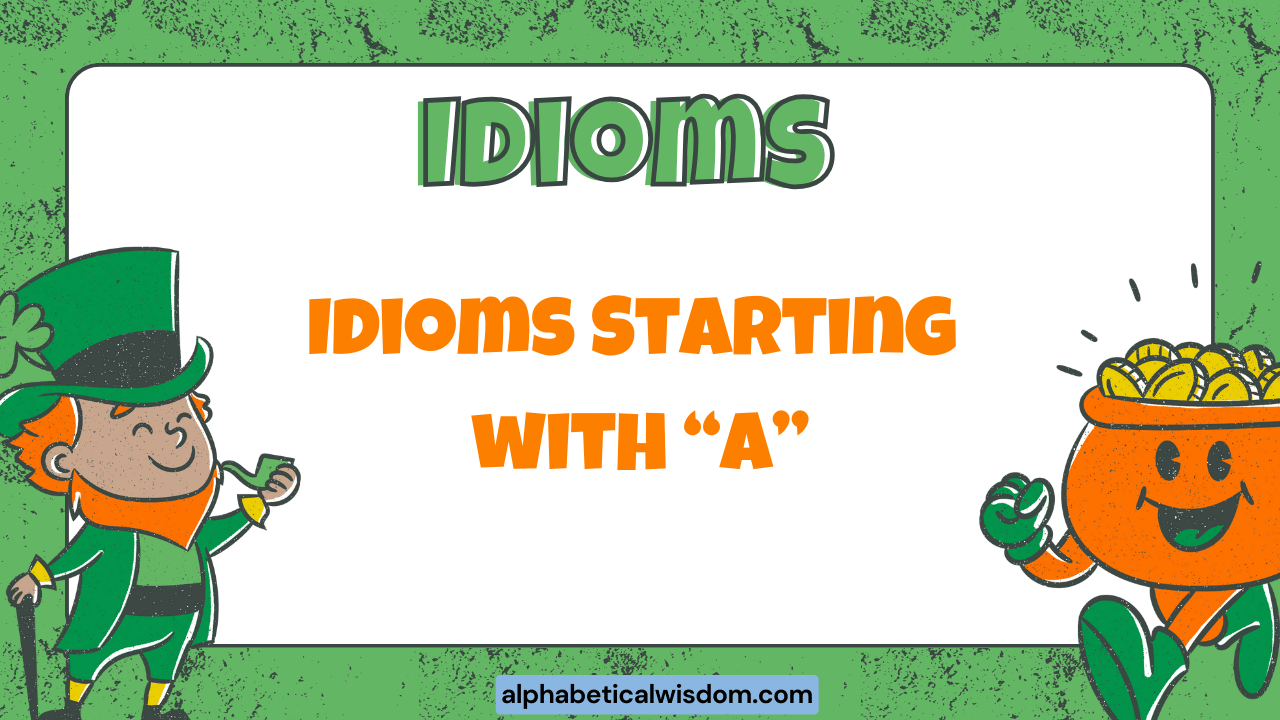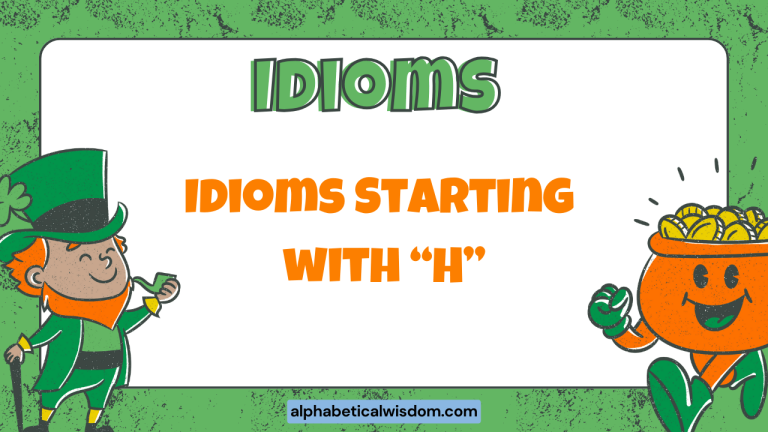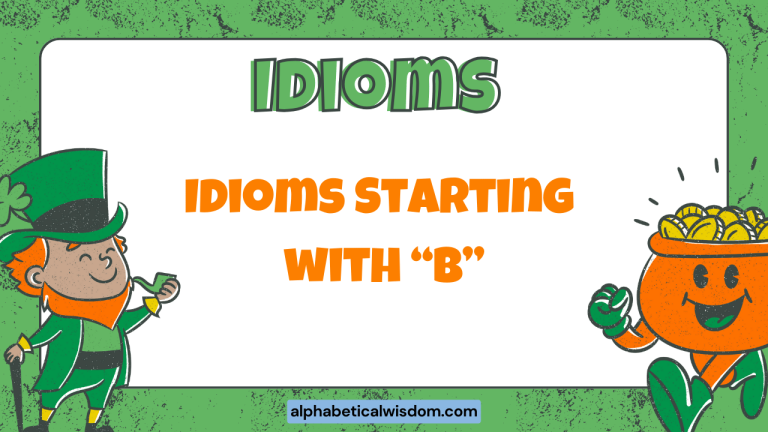Idioms Starting with “A”: Mastering Common English Expressions
Idioms are an integral part of the English language, adding color, depth, and nuance to everyday conversations and written communication. Understanding idioms, particularly those starting with the letter “A,” is crucial for anyone looking to improve their English proficiency and comprehend native speakers more effectively.
This article aims to provide a comprehensive guide to idioms starting with “A,” offering definitions, examples, usage rules, and practice exercises to help you master these common expressions and enhance your communication skills. Whether you’re an ESL student, a language enthusiast, or simply looking to expand your vocabulary, this guide will equip you with the knowledge and tools you need to confidently use and understand these idioms.
By exploring these idioms, learners of all levels can gain a deeper appreciation for the richness and complexity of the English language. This article provides a structured approach to learning, making it easy for you to incorporate these idioms into your everyday speech and writing.
Through clear explanations, practical examples, and engaging exercises, you’ll be well on your way to mastering these common English expressions.
Table of Contents
- Introduction
- Definition of Idioms
- Structural Breakdown of Idioms
- Types and Categories of Idioms
- Examples of Idioms Starting with “A”
- Usage Rules for Idioms
- Common Mistakes with Idioms
- Practice Exercises
- Advanced Topics in Idioms
- Frequently Asked Questions
- Conclusion
Definition of Idioms
An idiom is a phrase or expression whose meaning cannot be understood from the ordinary meanings of the words within it. In other words, idioms have a figurative meaning that is different from their literal meaning. Idioms are often culturally specific and add color and expressiveness to language. They are a fundamental part of any language, and mastering them is essential for achieving fluency and understanding native speakers.
Idioms can be classified based on their structure, function, and the context in which they are used. They can range from simple phrases to more complex sentences, and they serve various purposes, such as adding emphasis, humor, or cultural context to a conversation or text.
Understanding idioms requires not only knowing their definitions but also recognizing the situations in which they are appropriately used.
The function of idioms is to convey meaning in a more vivid and memorable way than literal language. They often reflect cultural values, historical events, or common experiences, making them a window into the culture of the language.
Recognizing and using idioms correctly can greatly enhance your communication skills and help you connect with native speakers on a deeper level.
Structural Breakdown of Idioms
The structure of idioms can vary widely. Some idioms are short phrases consisting of only a few words, while others are more complex sentences.
Despite their varying lengths, idioms share the common characteristic of having a non-literal meaning. Understanding the structural patterns of idioms can help learners recognize and interpret them more easily.
Many idioms follow specific grammatical patterns. For example, some idioms are based on similes or metaphors, using words like “as” or “like” to make comparisons.
Others are based on common verbs or nouns, with the addition of prepositions or adverbs that alter their meaning. By studying these structural patterns, learners can develop a better intuition for understanding and using idioms correctly.
Consider the idiom “to kick the bucket,” which means to die. Structurally, it’s a simple verb phrase. However, its meaning is entirely figurative. Similarly, “to be in the same boat” means to be in the same difficult situation. Here, the structure involves a prepositional phrase, but the meaning extends beyond the literal words.
Types and Categories of Idioms
Idioms can be categorized in several ways, including by their grammatical structure, semantic function, or the topic they relate to. Here are some common types of idioms:
- Phrasal Verbs: These are idioms that consist of a verb and a preposition or adverb, such as “look up to” (to admire) or “put up with” (to tolerate).
- Clichés: These are idioms that have become overused and predictable, such as “as old as the hills” or “better late than never.”
- Proverbs: These are short, well-known sayings that express a general truth or piece of advice, such as “a penny saved is a penny earned” or “actions speak louder than words.”
- Metaphorical Idioms: These are idioms that use metaphors to convey their meaning, such as “to break the ice” (to initiate a conversation) or “to have a heart of gold” (to be kind and generous).
- Similes: These idioms use “like” or “as” to compare two unlike things, such as “as busy as a bee” or “as clear as mud.”
Categorizing idioms helps learners understand their nuances and use them appropriately. For example, knowing that an idiom is a cliché might influence whether you choose to use it in formal writing, while understanding that an idiom is a proverb can help you use it to offer advice or express a general truth.
Examples of Idioms Starting with “A”
Here are several examples of idioms that begin with the letter “A,” categorized by their general meaning or usage.
Idioms Related to Quantity
These idioms often describe amounts or degrees, adding emphasis to the quantity being discussed.
The following table presents idioms related to quantity that start with the letter ‘A’. Each entry includes the idiom, its meaning, and an example sentence to illustrate its usage.
| Idiom | Meaning | Example Sentence |
|---|---|---|
| A bad apple | A negative or corrupting influence. | The new employee turned out to be a bad apple, causing problems for the entire team. |
| A dime a dozen | Very common and inexpensive. | Those types of phone cases are a dime a dozen; you can find them anywhere. |
| A far cry from | Very different from. | This hotel is a far cry from the luxurious resorts we usually stay at. |
| A few sandwiches short of a picnic | Not very intelligent. | He’s a few sandwiches short of a picnic if he thinks that plan will work. |
| A drop in the bucket | A very small amount compared to what is needed. | The money we raised is just a drop in the bucket compared to the total cost of the project. |
| A world of difference | A significant difference. | There’s a world of difference between working hard and working smart. |
| A pinch of salt | To not take something too seriously. | Take his comments with a pinch of salt; he’s always exaggerating. |
| A cut above | Superior to. | Her work is a cut above the rest of the class. |
| A shadow of your former self | Much weaker or unhealthier than before. | After his illness, he was a shadow of his former self. |
| A clean slate | A fresh start. | The new year is a chance to start with a clean slate. |
| A matter of time | Something that will definitely happen in the future. | It’s just a matter of time before he gets promoted. |
| A piece of cake | Very easy. | The exam was a piece of cake; I finished it in half the time. |
| A mixed bag | A collection of different things, some good and some bad. | The reviews for the new movie are a mixed bag. |
| A tough row to hoe | A difficult task to undertake. | Starting a business during a recession is a tough row to hoe. |
| A long shot | Something with a very low chance of success. | Winning the lottery is a long shot, but people still try. |
| A new lease on life | A chance to start over or feel rejuvenated. | After surviving the accident, he felt like he had a new lease on life. |
| A balancing act | Trying to manage multiple things at once. | Being a working parent is a balancing act. |
| A ballpark figure | An approximate estimate. | Can you give me a ballpark figure for the cost of the repairs? |
| A basket case | Someone who is emotionally unstable or unable to cope. | After the breakup, she was a basket case for weeks. |
| A crying shame | Something that is very unfortunate or regrettable. | It’s a crying shame that so many people are homeless. |
| A double-edged sword | Something that has both positive and negative effects. | Technology can be a double-edged sword, offering convenience but also posing risks. |
| A fool’s errand | A task that has no hope of success. | Trying to convince him to change his mind is a fool’s errand. |
| A game changer | Something that dramatically alters the situation. | The new technology is a game changer for the industry. |
| A grey area | A situation that is unclear or ambiguous. | The rules are a grey area when it comes to using company resources for personal projects. |
| A hard pill to swallow | Something difficult to accept. | Losing the championship was a hard pill to swallow. |
| A hot potato | A controversial or problematic issue. | The issue of immigration is a hot potato in many countries. |
| A leap of faith | Taking a risk based on trust or belief. | Starting a new business requires a leap of faith. |
| A means to an end | Something done to achieve a particular goal. | Working at the fast-food restaurant was just a means to an end while he looked for a better job. |
| A necessary evil | Something unpleasant that must be accepted to achieve a desired outcome. | Taxes are a necessary evil for funding public services. |
Idioms Related to Time
These idioms often involve timing, duration, or the sequence of events.
The following table presents idioms related to time that start with the letter ‘A’. Each entry includes the idiom, its meaning, and an example sentence to illustrate its usage.
| Idiom | Meaning | Example Sentence |
|---|---|---|
| At the drop of a hat | Immediately, without hesitation. | He’s willing to help at the drop of a hat. |
| Against the clock | Rushing to meet a deadline. | We were working against the clock to finish the project on time. |
| Ahead of the curve | Being innovative and advanced. | The company is ahead of the curve in developing new technologies. |
| All in good time | Eventually, at the right moment. | You’ll understand all in good time, just be patient. |
| Around the clock | Continuously, 24 hours a day. | The hospital provides care around the clock. |
| As time goes by | As time passes. | As time goes by, things change and evolve. |
| At the eleventh hour | At the last possible moment. | He submitted his application at the eleventh hour. |
| At death’s door | Very close to dying. | He was at death’s door after the accident. |
| After my time | Something that happened before one was born or old enough to remember. | The old buildings were built after my time. |
| As quick as a flash | Very quickly. | He ran as quick as a flash to catch the bus. |
| At a snail’s pace | Very slowly. | The traffic was moving at a snail’s pace. |
| All along | From the beginning. | I knew all along that he was the culprit. |
| At long last | Finally, after a long delay. | At long last, the project was completed. |
| A month of Sundays | A very long time. | I haven’t seen him in a month of Sundays. |
| As good as new | In excellent condition, like something new. | After the repairs, the car was as good as new. |
| As old as the hills | Very old. | That joke is as old as the hills. |
| At the crack of dawn | Very early in the morning. | We have to wake up at the crack of dawn to catch the flight. |
| At one’s earliest convenience | As soon as possible. | Please respond to this email at your earliest convenience. |
| Along the lines of | Similar to. | I’m thinking of a design along the lines of what we discussed. |
| At this stage of the game | At this point in a process or situation. | At this stage of the game, we can’t afford any more mistakes. |
| As we speak | Right now, at this very moment. | As we speak, the negotiations are still ongoing. |
| All day long | Throughout the entire day. | It rained all day long yesterday. |
| A while back | Some time ago. | I saw him a while back at the conference. |
| At a later date | At some point in the future. | We’ll discuss this issue at a later date. |
| Around the corner | Very near in time or place. | Spring is just around the corner. |
| A short while | A brief period of time. | I’ll be back in a short while. |
| Ahead of time | Earlier than scheduled. | We finished the project ahead of time. |
| At present | Currently, now. | At present, we are fully booked. |
| All of a sudden | Suddenly, unexpectedly. | All of a sudden, the lights went out. |
Idioms Related to Agreement
These idioms often describe situations of accord, harmony, or consensus.
The following table presents idioms related to agreement that start with the letter ‘A’. Each entry includes the idiom, its meaning, and an example sentence to illustrate its usage.
| Idiom | Meaning | Example Sentence |
|---|---|---|
| Agree to disagree | Accepting that you have different opinions and ceasing to argue. | We’ll just have to agree to disagree on this issue. |
| All in all | Considering everything. | All in all, it was a successful event. |
| All things being equal | If all conditions are the same. | All things being equal, I’d prefer to work from home. |
| As far as I’m concerned | In my opinion. | As far as I’m concerned, this is the best solution. |
| At one with | In harmony with. | He felt at one with nature during his camping trip. |
| After all | Despite everything; considering that. | After all, we’re all on the same team. |
| All right | Acceptable; satisfactory. | The plan sounds all right to me. |
| All systems go | Everything is ready to start. | All systems go for the launch tomorrow. |
| At peace | In a state of calmness and tranquility. | She felt at peace after meditating. |
| A nod and a wink | Implicit agreement or understanding. | The deal was sealed with a nod and a wink. |
| As one | In complete agreement. | The community stood as one in support of the victims. |
| Along with | In addition to. | I’ll bring the drinks along with the snacks. |
| Acceptable to | Meeting the required standards or conditions. | The proposal was acceptable to the committee. |
| According to | As stated by. | According to the weather forecast, it will rain tomorrow. |
| All parties concerned | Everyone involved. | All parties concerned agreed to the terms of the contract. |
| As per | According to. | As per your request, I have attached the document. |
| At the discretion of | Depending on the judgment of. | The decision is at the discretion of the manager. |
| All in agreement | Everyone agrees. | We are all in agreement to proceed with the plan. |
| As you wish | As you desire. | “Can you do this for me?” “As you wish.” |
| Assuredly | Certainly, definitely. | He will assuredly be there on time. |
| As a rule | Generally, usually. | As a rule, we have meetings every Monday. |
| At all events | In any case, whatever happens. | At all events, we should be prepared. |
| Approve of | To have a favorable opinion of. | I approve of your decision. |
| As regards | Concerning, regarding. | As regards the budget, we need to make some adjustments. |
| As much as | To the same degree as. | I like coffee as much as I like tea. |
| Associated with | Connected to. | This disease is associated with poor diet. |
| At par with | Equal to. | His skills are at par with the other team members. |
| As it were | In a way, so to speak. | He is, as it were, the leader of the group. |
| As the crow flies | In a straight line. | The distance is shorter as the crow flies. |
Idioms Related to Action
These idioms often describe specific actions, behaviors, or processes.
The following table presents idioms related to action that start with the letter ‘A’. Each entry includes the idiom, its meaning, and an example sentence to illustrate its usage.
| Idiom | Meaning | Example Sentence |
|---|---|---|
| Act your age | Behave maturely. | Stop being so childish and act your age. |
| Add fuel to the fire | Make a situation worse. | His comments only added fuel to the fire. |
| Against all odds | Despite a very low chance of success. | He succeeded against all odds. |
| Aim for the stars | Set high goals. | Aim for the stars and you might reach the moon. |
| All bets are off | The outcome is uncertain. | All bets are off now that the rules have changed. |
| All hands on deck | Everyone needs to help. | All hands on deck, we need to finish this project. |
| Alter course | Change direction or plan. | We had to alter course due to the unexpected challenges. |
| Answer the call | Respond to a need or duty. | He answered the call to serve in the military. |
| Arrive at a decision | Reach a conclusion. | After much discussion, they arrived at a decision. |
| As a last resort | As the final option. | We’ll use this method as a last resort. |
| Attack head-on | Confront a problem directly. | We need to attack head-on the challenges we face. |
| Act up | Behave badly or malfunction. | The car started to act up on the way home. |
| Add insult to injury | Make a bad situation worse. | To add insult to injury, it started raining after we lost the game. |
| All over the place | Disorganized or scattered. | His ideas were all over the place. |
| Apply oneself | Work diligently. | If you apply yourself, you can achieve anything. |
| Above board | Honest and legal. | The business deal was completely above board. |
| Accuse of | To blame someone for something. | They accused him of lying. |
| Allow for | To take into consideration. | We need to allow for unexpected delays. |
| Ask for trouble | Behave in a way that is likely to cause problems. | You’re asking for trouble if you drive that fast. |
| Attend to | To take care of. | Please attend to these matters immediately. |
| Amount to | Add up to or be equivalent to. | The total cost will amount to $500. |
| Answer to | To be accountable to someone. | He has to answer to the CEO. |
| Act on | To take action based on something. | We need to act on this information immediately. |
| Adhere to | To follow or stick to. | You must adhere to the rules. |
| Appeal to | To make a request or plea. | We will appeal to the court’s decision. |
| Assign to | To give a task or responsibility to someone. | The project was assigned to her. |
| Associate with | To spend time with or be connected to. | He likes to associate with successful people. |
| Abide by | To follow or obey. | You must abide by the laws of the country. |
| Account for | To explain or justify. | Can you account for your absence yesterday? |
Idioms Related to Appearance
These idioms often describe how things look or seem, or how people present themselves.
The following table presents idioms related to appearance that start with the letter ‘A’. Each entry includes the idiom, its meaning, and an example sentence to illustrate its usage.
Usage Rules for IdiomsUsing idioms correctly requires understanding not only their meanings but also the contexts in which they are appropriate. Here are some general rules to follow when using idioms:
- Know Your Audience: Consider your audience and the formality of the situation. Some idioms are informal and may not be appropriate in formal settings.
- Understand the Context: Make sure you understand the context in which the idiom is used. Idioms can have different meanings in different situations.
- Use Correct Grammar: While idioms themselves are fixed expressions, you may need to adjust the grammar to fit the sentence. For example, you might need to change the tense of a verb or the number of a noun.
- Avoid Overuse: Using too many idioms can make your speech or writing sound unnatural or forced. Use them sparingly and only when they add value to your communication.
- Be Aware of Cultural Differences: Idioms are often culturally specific, so be aware of the cultural background of your audience. An idiom that is common in one culture may be unfamiliar or offensive in another.
By following these rules, you can use idioms effectively and appropriately, enhancing your communication skills and connecting with native speakers on a deeper level.Common Mistakes with IdiomsOne of the challenges of learning idioms is avoiding common mistakes. Here are some typical errors that learners make when using idioms:
- Literal Interpretation: Interpreting idioms literally is a common mistake. Remember that idioms have a figurative meaning that is different from the literal meaning of the words.
- Incorrect Word Order: Idioms often have a fixed word order, and changing the order of the words can alter their meaning or make them nonsensical.
- Wrong Prepositions: Many idioms include specific prepositions, and using the wrong preposition can change the meaning of the idiom.
- Mixing Idioms: Avoid mixing parts of different idioms together, as this can create confusion and make your speech sound unnatural.
- Overusing Idioms: Using too many idioms in a short period can make your speech sound forced or unnatural. Use them sparingly and only when they add value to your communication.
To avoid these mistakes, it’s important to study idioms carefully and practice using them in context. Pay attention to the correct word order, prepositions, and the overall meaning of the idiom.With practice, you can learn to use idioms accurately and confidently.Practice ExercisesTo reinforce your understanding of idioms starting with “A,” try the following exercises.
Exercise 1: Fill in the Blanks
Complete the following sentences with the appropriate idiom from the list below.
- The project was completed __________, thanks to the team’s hard work.
- He decided to start his own business, taking __________.
- The politician’s promises turned out to be __________.
- We need to address this issue __________, before it gets out of hand.
- After the accident, he felt like he had __________.
Idiom Choices:
- a new lease on life
- a leap of faith
- attack head-on
- all show and no substance
- ahead of time
Answer Key:
- The project was completed ahead of time, thanks to the team’s hard work.
- He decided to start his own business, taking a leap of faith.
- The politician’s promises turned out to be all show and no substance.
- We need to address this issue attack head-on, before it gets out of hand.
- After the accident, he felt like he had a new lease on life.
Exercise 2: Multiple Choice
Choose the correct meaning of the idiom in the following sentences.
- He’s willing to help at the drop of a hat. What does “at the drop of a hat” mean?
- After some consideration
- Immediately, without hesitation
- When he has time
- They are as alike as two peas in a pod. What does “as alike as two peas in a pod” mean?
- Very different
- Exactly the same
- Somewhat similar
- We’ll just have to agree to disagree on this issue. What does “agree to disagree” mean?
- Come to a compromise
- Accept that you have different opinions and cease to argue
- Continue arguing until you reach an agreement
Answer Key:
- b. Immediately, without hesitation
- b. Exactly the same
- b. Accept that you have different opinions and cease to argue
Exercise 3: Sentence Construction
Create your own sentences using the following idioms.
- a tough row to hoe
- all hands on deck
- as plain as day
Advanced Topics in IdiomsFor advanced learners, exploring the etymology and cultural context of idioms can provide a deeper understanding of their meanings and usage. Here are some advanced topics to consider:
- Etymology of Idioms: Research the origins of idioms to understand how they evolved over time. Many idioms have interesting historical or cultural roots that can shed light on their meanings.
- Cultural Variations: Explore how idioms vary across different cultures and regions. Some idioms are specific to certain dialects or countries, while others have different meanings in different cultural contexts.
- Idioms in Literature: Analyze how idioms are used in literature to add depth, nuance, and cultural context to the text. Pay attention to how authors use idioms to convey character, theme, and setting.
- Creating New Idioms: Consider the process of creating new idioms and how they become integrated into the language. Think about the factors that contribute to the success and longevity of an idiom.
By delving into these advanced topics, you can gain a more sophisticated understanding of idioms and their role in language and culture.Frequently Asked Questions
Why are idioms important in English?
Idioms are important because they are a fundamental part of the English language and are used frequently in everyday conversation and writing. Understanding idioms can help you comprehend native speakers more effectively and express yourself more fluently and naturally.
How can I learn idioms effectively?
To learn idioms effectively, start by studying their definitions and examples in context. Practice using idioms in your own speech and writing, and pay attention to how native speakers use them.
Use flashcards, online resources, and language learning apps to reinforce your knowledge.
Are idioms the same in all English-speaking countries?
No, idioms can vary across different English-speaking countries and regions. Some idioms are specific to certain dialects or cultures, while others may have different meanings in different contexts.
Be aware of these variations when learning and using idioms.
What should I do if I don’t understand an idiom?
If you don’t understand an idiom, ask for clarification. You can ask the speaker to explain the meaning of the idiom or look it up in a dictionary or online resource.
Context clues can also help you infer the meaning of an unfamiliar idiom.
How can I avoid making mistakes when using idioms?
To avoid making mistakes when using idioms, study them carefully and practice using them in context. Pay attention to the correct word order, prepositions, and the overall meaning of the idiom.
Avoid literal interpretations and mixing idioms together.
ConclusionMastering idioms starting with the letter “A” can significantly enhance your English language skills and enable you to communicate more effectively and naturally. By understanding the definitions, usage rules, and common mistakes associated with these expressions, you can confidently incorporate them into your everyday speech and writing.Remember to practice regularly, pay attention to context, and be aware of cultural variations. With dedication and effort, you’ll be well on your way to mastering these common English expressions and achieving fluency in English.
| Idiom | Meaning | Example Sentence |
|---|---|---|
| All that glitters is not gold | Appearances can be deceptive. | All that glitters is not gold; be careful what you trust. |
| Appear out of nowhere | To suddenly appear. | He seemed to appear out of nowhere. |
| As plain as day | Very obvious. | It’s as plain as day that he is lying. |
| All dressed up | Wearing formal or fancy clothes. | She was all dressed up for the party. |
| Appear to be | To seem like. | He appears to be very tired. |
| As far as appearances go | Based on what can be seen. | As far as appearances go, everything seems fine. |
| Appear in disguise | To change one’s appearance to hide one’s identity. | The spy appeared in disguise to avoid detection. |
| As alike as two peas in a pod | Very similar in appearance or behavior. | They are as alike as two peas in a pod. |
| Assume a pose | To strike a particular posture, often for a photograph. | She assumed a pose for the camera. |
| Asleep at the switch | Not paying attention or being negligent. In this context, implies a lack of attentiveness that affects one’s appearance or behavior. | The security guard was asleep at the switch, and the thief got away. |
| Add color to | To make something more interesting or lively. | Her stories add color to the conversation. |
| All eyes on | Everyone is watching. | All eyes on the performer as he took the stage. |
| As good as gold | Well-behaved and obedient. | The children were as good as gold during the trip. |
| As white as a ghost | Very pale, often from fear or shock. | She turned as white as a ghost when she heard the news. |
| At face value | As it appears, without deeper analysis. | We should not take everything at face value. |
| As a facade | As a deceptive outward appearance. | His smile was just a facade to hide his true feelings. |
| All show and no substance | Appearing impressive but lacking depth or quality. | The product was all show and no substance. |
| As a front | As a false appearance used to conceal a real activity. | The business was used as a front for illegal activities. |
| Adorn with | To decorate with. | The room was adorned with flowers. |
| As appearances go | Judging by outward signs. | As appearances go, he seems like a nice person. |
| Above all | Most importantly. | Above all, honesty is the best policy. |
| As is | In its current condition. | The car is sold as is, with no warranty. |
| As if from a mold | Identical in appearance. | The houses in the neighborhood looked as if from a mold. |
| As smart as they come | Extremely intelligent. | She’s as smart as they come. |
| As someone sees it | From someone’s point of view. | As he sees it, the plan is perfect. |






